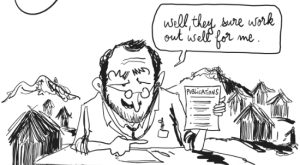Support the stream: https://streamlabs.com/deanbaker1
Read More »Dean Baker Live Stream
Support the stream: https://streamlabs.com/deanbaker1
Read More »Dean Baker Live Stream
Support the stream: https://streamlabs.com/deanbaker1
Read More »Dean Baker Live Stream
Support the stream: https://streamlabs.com/deanbaker1
Read More »Economics 101: Dog barking, overgrazing and ecological collapse
from Edward Fullbrook and RWER Special Issue: Economics and the Ecosystem “the collapse of our civilisations and the extinction of much of the natural world is on the horizon”(David Attenborough) Today’s economics, especially Economics 101, is a major source of humankind’s denial of the possibility of the calamity of all calamities which our economy is engineering. Annually millions of students around the world are forced to study textbooks that indoctrinate them in to thinking that there...
Read More »As US economy weakens, economists struggle to predict next recession
from Dean Baker Many of the people who completely missed the worst recession since the Great Depression are trying to get out front and tell us about the next one on the way. The big item glowing in their crystal ball is an inversion of the yield curve. There has been an inversion of the yield curve before nearly every prior recession and we have never had an inversion of the yield curve without seeing a recession in the next two years. Okay, if you have no idea what an inversion of...
Read More »RCTs — a method in search of ontological foundations
from Lars Syll RCTs treat social reality as though some simulacrum of laboratory conditions was a feasible and appropriate scientific method to apply, but in development research, unlike laboratory condition treatments, interventions are not manipulations of individuated and additive or simply combinable material components … but rather intervention into material social relations. While for the former, assuming away or stripping away everything other than a given effect focus can reveal...
Read More »Traits of modern beliefs that are at the core of today’s crisis.
from Richard Norgaard Changes in European perceptions of themselves, both with respect to nature and social organization, also coevolved around very important new ideas about individualism that coevolved with the rise in atomism in natural philosophy. Martin Luther’s call for reform of the Catholic Church stressed that individuals were responsible for their own salvation through their own reading of the Bible, the only true source for coming to know Christ and God. Luther’s call awakened...
Read More »Dean Baker Live Stream
Support the stream: https://streamlabs.com/deanbaker1
Read More »European Court of Justice to decide if public institutions have a right to refuse cash
from Norbert Häring On 27 March, the highest administrative court in Germany, the Bundesverwaltungsgericht, has referred my case to the European Court of Justice (ECJ) in Luxembourg. I have insisted to pay my legally required contributions to public radio and TV with the legal tender, euro cash. This is not possible according to their regulations. The Bundesverwaltungsgericht has ruled that there is indeed a requirement for all public institutions to accept cash based on §14 of the...
Read More » Real-World Economics Review
Real-World Economics Review


